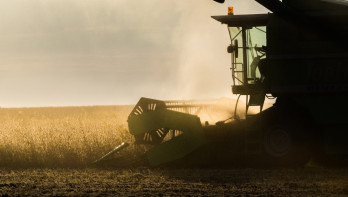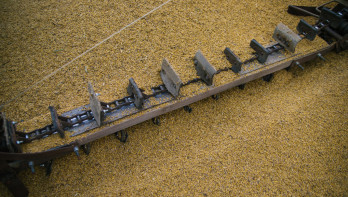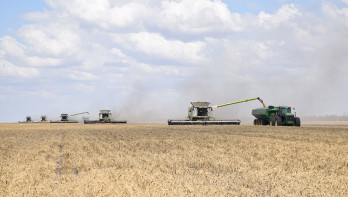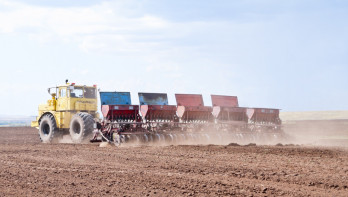Analysis Grain
Rain continues to cause problems in European wheat
Rain remains the characteristic of this growing season in Western Europe, no matter how you look at it. Showers quickly put an end to a summery day yesterday at the end of the afternoon and evening. The wet conditions are once again causing problems during the wheat harvest, as reported by the French Ministry of Agriculture. The expected French wheat harvest is likely to drop below 30 million tons for the third time in twenty years, according to the ministry. In the US, there are fewer concerns about rain but it is the heat in the weather forecasts that is making corn growers nervous.
The September wheat contract on the Matif closed €4.75 higher at €226 per ton yesterday. The grains also showed a cautious recovery on the CBoT. Wheat increased by 0.2% to $5.54¼ per bushel. Corn performed better and closed 1.1% higher at $4.00¼ per bushel. Soybeans took a step back by 1.1%, ending at $11.61½ per bushel.
It just won't dry up in Western Europe. That wet weather is not without consequences for the wheat. Yesterday, the French Ministry of Agriculture released a yield forecast for the country. The ministry expects 29.65 million tons of wheat this season. This makes the ministry slightly more optimistic than Arvalis and Intercereales, who predicted a yield of 28.13 million tons last Friday. "In the last twenty years, there were two other harvests that remained below 30 million tons," writes the French Ministry of Agriculture in the report. The harvest this season is likely to be similar to 2020 when a total of 29.2 million tons were threshed.
This season is characterized by rain according to the ministry. Due to the wet autumn, 10.8% less wheat was sown in France this season, with the area totaling 4.24 million hectares. Last spring in France was the fourth wettest since the start of measurements. According to Meteo France data, this spring saw up to 45% more rain than the ten-year average in the reference period 1991-2020. In June, there was 20% more rain. As the harvest begins, it is still wet. This is causing problems with the quality of the wheat. The crop is susceptible to fungal diseases, and damage can already be seen in some fields.
Forced to switch to spring barley and corn
In addition to a smaller wheat harvest, the French Ministry of Agriculture also expects a smaller winter barley harvest. The total winter barley yield is estimated at 8 million tons, which is 17.5% less than in 2023. Due to the wet autumn, French farmers have been forced to sow other crops. The spring barley yield is estimated at 3.3 million tons, compared to 2.6 million tons last season. The corn area has been revised upwards to 1.6 million hectares, which is 22% more than last season.
The EU's wheat exports up to June 30 amount to 31.0 million tons. This has significantly reduced the export lag compared to the previous season. Last season, 31.6 million tons of wheat were exported during the same period.
Heat on the way
In the US, the remnants of Hurricane Beryl are moving northward across the central and eastern parts of the corn belt. Rainfall of 25 to 75 millimeters is expected, which is welcome in this region where it is starting to become dry. More concern is focused on the temperature. This weekend, temperatures will rise above 30 degrees Celsius. Corn is entering a critical phase as it enters the tasseling stage. According to the Crop Progress report, 24% was in the tasseling stage last week. The weather during the period around pollination is crucial for the final yield.
Participants in Crop Watch are cautious with their yield expectations, Reuters reports. The weather is more favorable for American corn and soybean growers than in recent years, but the crops are not uniformly in excellent condition. The potential is there, but it still needs to happen, seems to be the growers' opinion.




